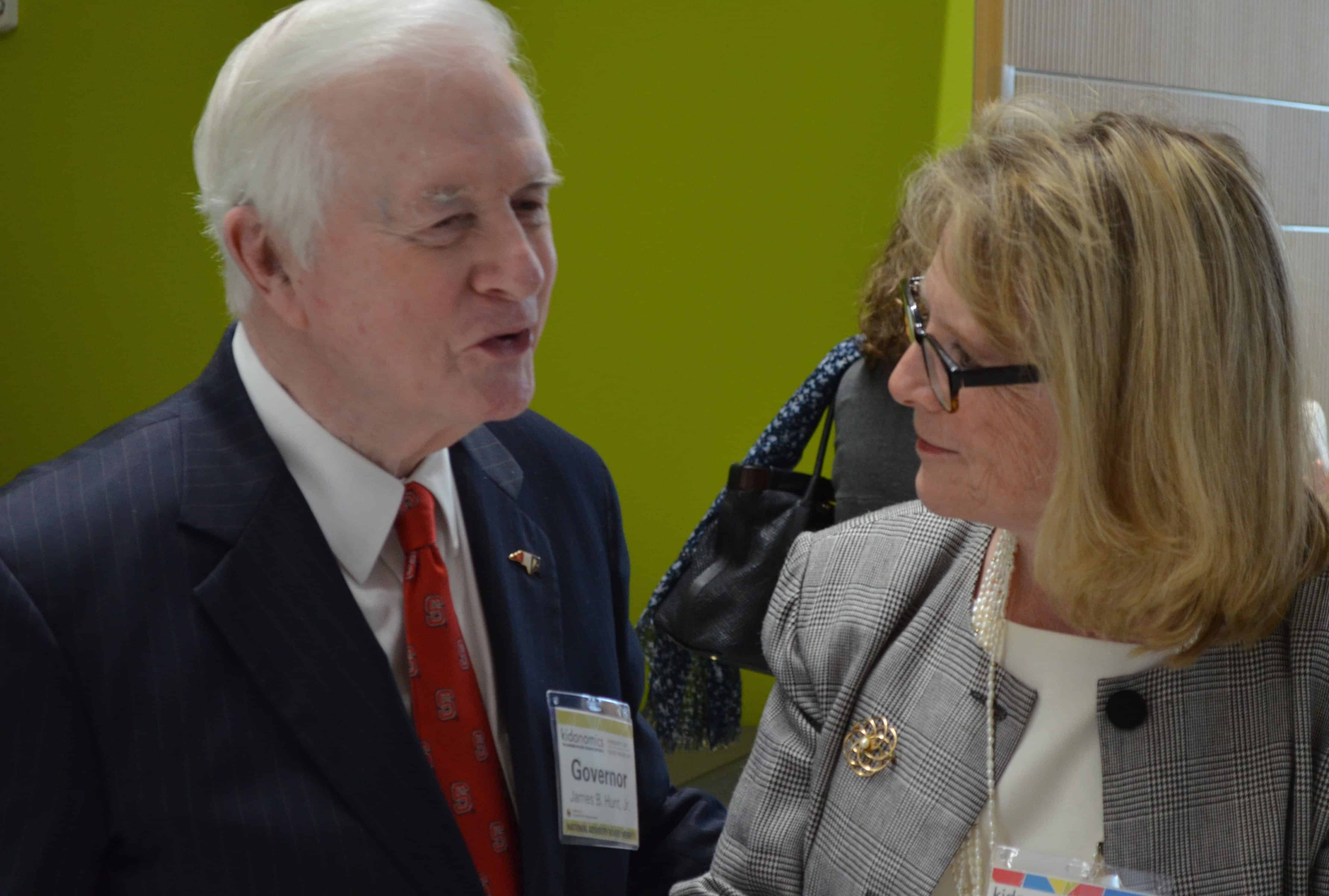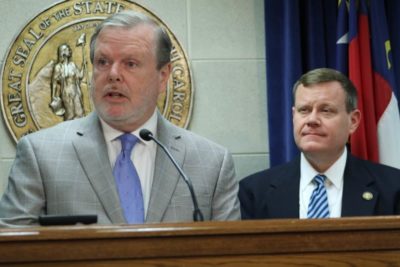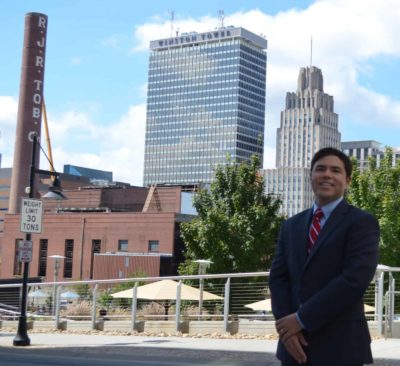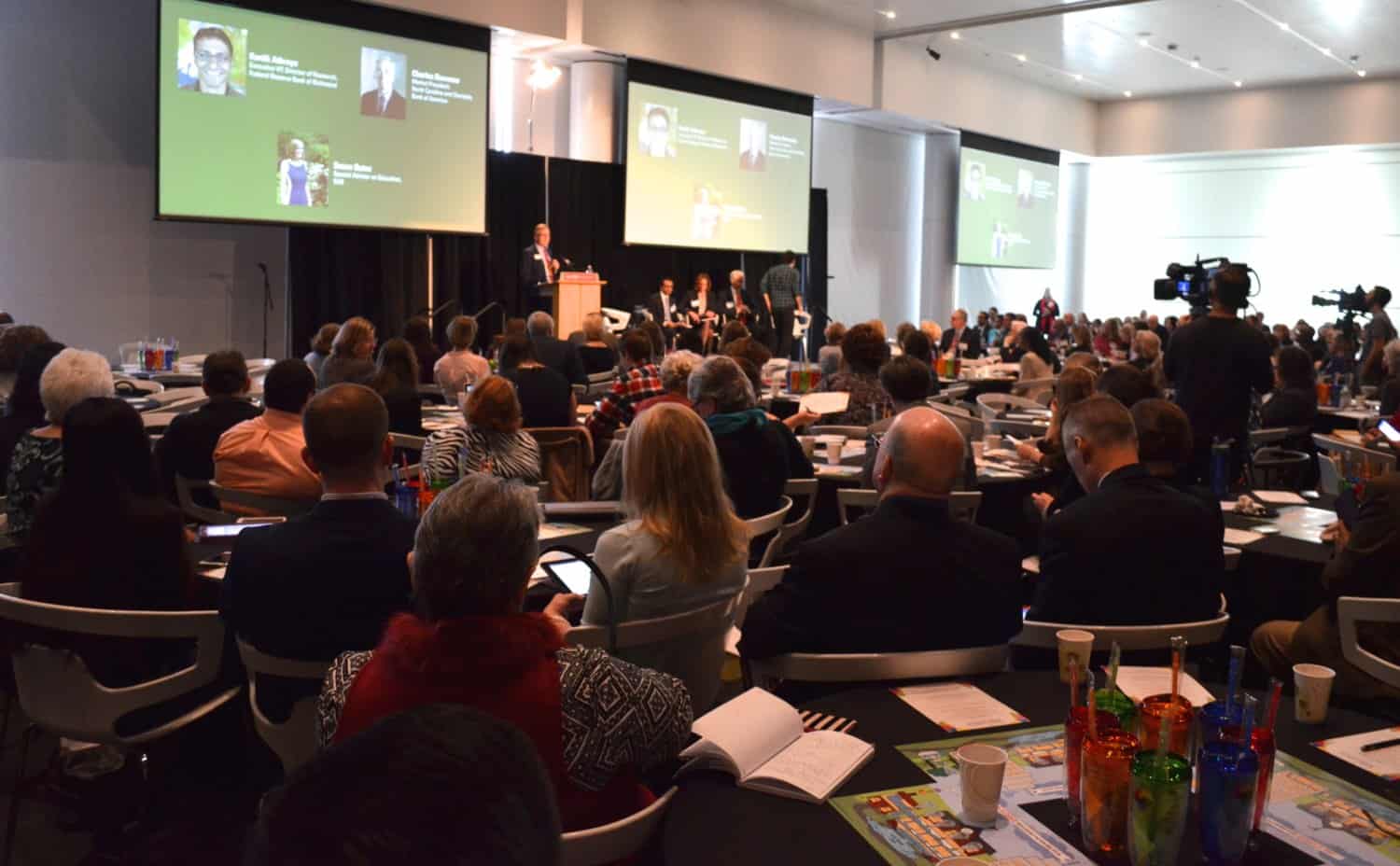The Institute for Emerging Issues (IEI) at North Carolina State University kicked off its kidoNomiCs project yesterday at the James B. Hunt Library on the campus of NCSU.
The group’s focus this year is early childhood education, and in a break with the past, IEI will focus on this topic for two entire years.
“One of the challenges whenever you do a different issue every year is that you can only take it so far,” said Leslie Boney, the director of IEI. “The challenge is that as soon as you finish talking about one, you have to start working on the next one.”
Last year, IEI focused on the impact of automation on employment and education systems. Boney said that was a topic that was new for many North Carolinians.
“When we talked about automation, there was some being written about it in the academic community…but for the most part a lot of people in North Carolina were hearing about the issue for the first time,” he said.
With early childhood education — an area North Carolina has been a leader in for years — the state’s residents have much more familiarity.
But while there has been momentum on the issue, Boney said some communities are getting stuck in their efforts to provide high-quality early childhood education.
“There are a lot of people that know the issue matters and care about it, but there has not been as much organization on the regional and county level,” he said.
As part of IEI’s efforts, the organization is going to work with five communities across the state that are trying to up their “early childhood efforts to the next level.” Boney said these will be communities that need help but have some capacity already, so they can serve as role models or pilots for the rest of the state.
IEI will also work with the business and non-profit communities on the issue of early childhood learning.
At the 2017 Emerging Issues Focus Forum event Tuesday, a variety of speakers explored the importance of early childhood education, discussing subjects like early brain development and the need for effective preschool.
Boney said during his opening remarks that there is no opponent when it comes to the topic of early childhood education.
“There is not an opposing group on the other side arguing for early childhood ignorance,” he said.

Former Governor Jim Hunt said that the state needs to look at early childhood education differently. It’s not just about helping kids, but the state as a whole.
“Isn’t it nice for our jobs and our economy and our growth? That’s what this is about,” he said, adding later. “We want them to come to school healthy and ready to learn and ready to fly.”
He discussed some of the early childhood interventions North Carolina offers, including Smart Start and NC Pre-K, and he said that they have a noticeable impact. “I can share with you today that Smart Start and NC Pre-K are working,” he said.
Despite their success, Hunt said the two programs receive less funding per child now than they did in 2001.
Susan Gates, a special advisor on education to SAS, said that the days of being able to graduate high school and get a job on a line in a manufacturing plant are over. Today, factories want people who can build and repair the robots that are doing what linemen once did.
“We’re going to need higher and higher levels of education,” she said.
There is a skills gap between what employers want and what NC’s graduates have to offer, she said.
Nathan Fox, a distinguished professor and chair of the Developmental Science Program at the University of Maryland, talked about the importance of early intervention on the proper development of children’s brains.
“Brains are built over time, starting in the earliest years of life,” he said.
Adverse impacts like abuse or even neglect can make learning difficult for children. Neglect is the most common form of negative impact experienced by children in North Carolina, he said. Fox said the impact of neglect on the brain is like having a dimmer switch that turns down brain activity and makes it harder for children to learn.
“A strong foundation in the early years improves the odds for positive outcomes, and a weak foundation increases the odds of later difficulties,” he said.
Tracy Zimmerman, the executive director of the NC Early Childhood Foundation, talked about the road ahead for early childhood education in North Carolina.
She touched on the skills gap and the inability of businesses to find skilled workers. And she pointed out the correlation between reading in early childhood and later success, noting that only 38 percent of the state’s 4th graders in 2015 scored at or above proficient in reading as measured by NAEP, the National Assessment of Educational Progress. And yet, she said that by 2020, it is estimated that 67 percent of state jobs will require some form of post-secondary education.
The gap can be improved by interventions in early childhood, including comprehensive measures designed to help children learn while they are young.
“There is good news in this. We can do this,” she said, though she added that we have to stop thinking there is some magic answer. “We have to drop the idea and the possibility that there is a silver bullet. If such a thing existed, I’m fairly certain we’d all be doing it.”
Zimmerman’s speech came towards the end of the day, and she asked the audience to think about how they could use all he information they had received throughout the day.
“We start by building on what North Carolina does well,” she said. “North Carolina has a proud, an incredibly proud, history of innovation and success. And we have so much to be proud of when it comes to educating young children,” she said.
She pointed to programs like Smart Start and NC Pre-K, as well as the early institution of publicly-funded kindergarten in N.C. as some areas where North Carolina has led.
“We are building on what has come before us, and it is now our moment to carry it to the next place,” she said.
She then talked about NC Pathways to Grade-Level Reading, an initiative that is a partnership between Zimmerman’s organization and others, such as NC Child, NC Partnership for Children, and BEST NC. It is attempting to make long-term change and ensure that all students are reading at grade level by the end of third grade.
See Zimmerman’s presentation in the video below.
The final speaker of the day was Democratic Governor Roy Cooper.
Cooper said he’s been talking to business groups across North Carolina, and he says he’s been basically asking them to spend their political capital on three things.
- Repealing House Bill 2
- Expanding Medicaid
- Making sure N.C. prioritizes public education
Cooper said that when he talks about public education, he’s talking about everything from early childhood education to K-12 to community colleges and the state’s university system.
He said that business leaders have the ear of the General Assembly and can make an impact.
“When they talk, the people in the General Assembly listen. Policymakers listen,” he said.
Cooper went on to say that it’s easy for a person to say they value education, but it takes more than talk to ensure students have access to high-quality learning.
“We know it’s an investment. We know that it costs,” he said. “And when you’re talking about priorities, you have to make choices. You can’t be for everything.”
Cooper talked about how big a part of his background education was. Cooper grew up in rural Eastern North Carolina, and his parents were the first in their families to go to college. “And by God, the two Cooper boys were going to college,” he said.
Cooper’s mother was a public school teacher, and he said he’s grateful for her hard work and for his public school education.
“I’m grateful for the early childhood education that I got from my parents that many kids don’t get unless we help them get it,” he said.
He then struck a dark note, saying that the state is falling behind.
“We’ve fallen behind with our support for early childhood education. We’ve fallen behind with helping to make sure we get the very best teachers and principals to lead our schools,” he said. “We’ve fallen behind on the support that we need to give to our community colleges and our universities.”
Education is going to be a fight in the General Assembly, and he said that’s why he’s asking business leaders and the attendees of the kidoNomiCs event to use their political capital to support it.
“You know where the investments need to be made in child care and pre-k,” he said. “You know that it’s going to require an investment.”
Cooper said he doesn’t think the state needs to raise taxes. But, he said the General Assembly shouldn’t give corporate tax breaks or cut taxes for wealthy N.C. residents when education is in need.
“When we’re talking about giveaways to people who are doing pretty well versus investment in education, I know the choice we have to make,” he said. “And we need everybody pulling together to convince the General Assembly that this is something we need to do.”
Cooper said that early childhood education works and is an investment in the future. He said North Carolina used to be the model for early childhood education and it must be again.
“You know that those kids who don’t have the books at home, who don’t have the attention, are not going to be ready for kindergarten like other kids who have the good fortune of having what I had,” he said.
Cooper said there are many Republicans who are interested in improving education, but the key is making sure that it is a top priority for them.
“What we have to do is to sit down and find areas where we agree. I’m already doing that with the leadership in the General Assembly, both Republican and Democratic,” he said.
See Cooper’s full comments in the video below.
Recommended reading




